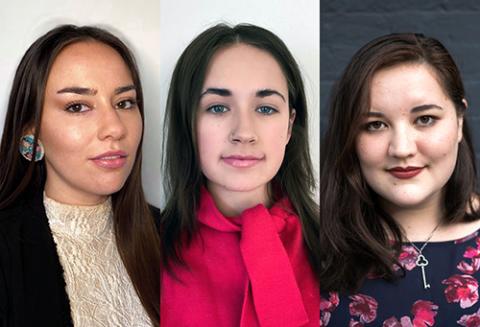An ‘Opportunity to Give Back’: First Graton Scholars Arrive at UCLA Law

Sharp and enthusiastic, Ashley Anderson was broadly engaged as a high school student in Tahlequah, Oklahoma. Varsity captain of the academic team. National Honor Society member. Two-time participant in the VEX Robotics World Championship, where she competed against kids from communities far from her home in Cherokee County. And through college at Harvard University and the years that followed, Anderson developed a strong focus and sense of purpose — a motivating ethic that she can now put into action as a Graton Scholar at UCLA School of Law. “I hope to use my legal training to ensure healthy ecosystems on tribal lands, including my hometown,” she says today.
Alongside Shara Burwell and Rachel Hsu, Anderson joins UCLA Law in large part thanks to a transformative full-tuition scholarship that was created one year ago through a gift of $15 million from the Federated Indians of Graton Rancheria. Burwell graduated from San Diego State University and worked for the innovative Peruvian organization Awamaki, creating economic and educational empowerment for Indigenous women and girls who work as artisanal weavers in rural communities. Hsu attended Barnard College and has worked as a tutor for disabled students, a legal assistant at an intellectual property law firm, a supervisor at a homeless shelter, and an intern at the Museum of Modern Art.
All three express deep gratitude for the scholarship and the opportunities that it presents.
“Higher education is often inaccessible, and the Graton Scholarship makes a significant difference in my ability to attend and excel in law school,” Hsu says. “I know that this institutional support will open doors for me.” Burwell is similarly eager to “pay the kindness forward.” And Anderson shares their unreserved optimism about becoming a lawyer and making a difference. “I want to work in the intersection of environmental and tribal law, so UCLA Law is a natural fit because of its innovative environmental and tribal law programs and clinics,” she says. “I am incredibly fortunate to have received the Graton Scholarship, and I hope to use this opportunity to give back to Native Nations.”
Giving back is at the heart of the commitment that the Federated Indians of Graton Rancheria share with UCLA Law: to create a substantial and lasting impact in Indian country. One key to the partnership is the Graton Scholars program, which brings to the law school the most talented and promising students who are from Native Nations or who are interested in pursuing careers as tribal advocates. UCLA Law has long been recognized as a leader among the country’s preeminent law schools in developing courses, programs, and scholarship addressing the legal standing and rights of Native peoples. Graton Scholars will thus gain an invaluable education and entrée into a distinguished Indian law network.
“We are so fortunate to be welcoming Ashley, Shara, and Rachel to UCLA Law as our first Graton Scholars. They are exceptional students, and we are lucky to have them,” says Professor Angela R. Riley, who oversees the Graton Scholars program. “We know that they — and the generations of Graton Scholars who follow them — will use their legal education to advocate for Indian country, defend tribal sovereignty, and advance Indigenous rights.” As one of the country’s top Indian law scholars, Riley directs UCLA Law’s Native Nations Law and Policy Center and UCLA’s M.A./J.D. Joint Degree Program in Law and American Indian Studies.
To be sure, the new law students are well on their way. “While I’m approaching law school with an open mind, I know my legal career will center around art and cultural property law,” Hsu says. “The protection of Native American cultural artifacts and practices deserve my greatest focus as the longest-standing cultural patrimony in Los Angeles, California, and North America overall.”
For Burwell, forging an impactful a career in the law has a personal significance. “My grandmother is a member of the Leech Lake band of the Ojibwe tribe and an Indian boarding school survivor. She was taken from her reservation and family and adopted to a white family, and yet, she is one of the lucky ones,” she says. “The systems of power are failing Indigenous women around the world and these women need an advocate to fight for them. I want to be that advocate.”